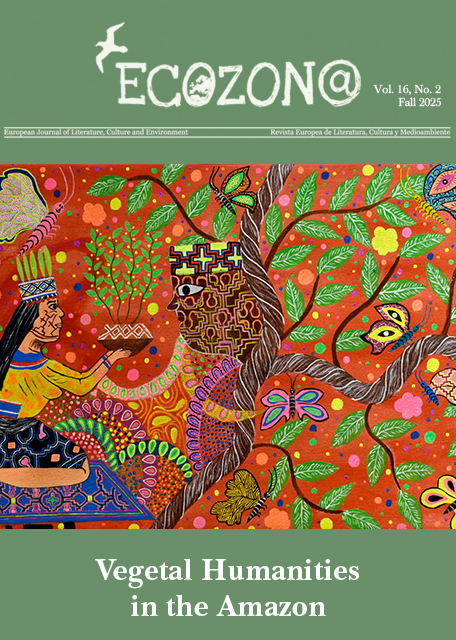<b>Pfister's Spill? Narratives of Failure in and around Wilhelm Raabe’s 1883 Eco-novel</b> // ¿El vertido de Pfister? Narrativas del fracaso en y en torno a la eco-novela de 1883 de Wilhelm Raabe
DOI:
https://doi.org/10.37536/ECOZONA.2016.7.1.988Parole chiave:
Wilhelm Raabe, pollution, narrative, science, public discourse, socio-natural site // Wilhelm Raabe, contaminación, narrativa, ciencia, discurso público, enclave socio-naturalAbstract
This paper explores different aspects and layers of failure in Wilhelm Raabe’s Pfister’s Mill and its cultural context, which is closely related to German discourse on the environment in the second half of the nineteenth century. Raabe sought to draw attention to and inspire solutions for a pressing environmental problem of the day by conveying perceptions of everyday sensual experience in culturally communicable form. His aim was to use the novel as a means of communication about the processes whereby “socio-natural sites” affected by industrial pollution were being transformed. The author’s ultimate inability to realize this aim, the paper argues, should be understood less as a failure of literary form than as a consequence of an inherent feature of the public discourse on political ecology of the time: the tension between popular support for progress and industrial development on the one hand and growing environmental awareness within a limited range of political action on the other. Drawing not only on literary, but also historical sources, the paper seeks to (dis)entangle the complex net of relations around a classic of German environmental literature.
Resumen
Este trabajo explora diferentes aspectos y secciones relativas al fracaso en la obra de Wilhelm Raabe Pfister’s Mill y su contexto histórico, el cual está estrechamente relacionado con el discurso alemán sobre el medio ambiente en la segunda mitad del siglo XIX. Raabe trató de llamar la atención y esbozar soluciones respecto a un problema medioambiental de alta importancia para aquellos días, siendo su objetivo transmitir y analizar las percepciones a través de experiencias cotidianas de carácter sensorial que se hacen manifiestas culturalmente mediante la comunicación. Su objetivo es utilizar la novela como un medio de comunicación de los procesos que provocan transformaciones en “enclaves socio-naturales” afectados por contaminación industrial. La incapacidad en última instancia del autor para alcanzar este objetivo hace que el presente ensayo no deba entenderse como un fracaso de la forma literaria, sino como una característica inherente al discurso público sobre la ecología política de la época: que se fundamenta en el cambio de percepción popular del medio ambiente. Se refiere no sólo a documentes literarios, sino también a fuentes históricas, este trabajo pretende desentrañar una compleja red de relaciones en torno una obra clásica de literatura ecológica alemana.
Downloads
##submission.downloads##
Pubblicato
Fascicolo
Sezione
Licenza
Authors who publish with this journal agree to the following terms:
a) Authors retain copyright and grant the journal right of first publication with the work simultaneously licensed under a Creative Commons Attribution License that allows others to share the work with an acknowledgement of the work's authorship and initial publication in this journal (CC BY-NC for articles and CC BY-NC-ND for creative work, unless author requests otherwise.
b) Authors are able to enter into separate, additional contractual arrangements for the non-exclusive distribution of the journal's published version of the work (e.g., post it to an institutional repository or publish it in a book), with an acknowledgement of its initial publication in this journal.
c) Authors are permitted and encouraged to post their work online (e.g., in institutional repositories or on their website) prior to and during the submission process, as it can lead to productive exchanges, as well as earlier and greater citation of published work (See The Effect of Open Access).










